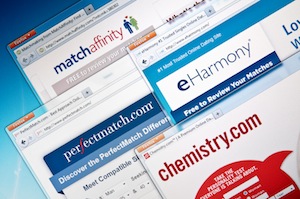
Online Dating Sites
The Responsible Dating Site
Safe dating online involves choosing dating services that protect your privacy. Aren’t romance and dating, after all, the progress from a state of being unknown — complete privacy — to intimacy, or privacy shared by another? The right to privacy has been of headline and global importance for some time as it is a valuable possession; we have to expend effort just to keep it. Your very image, your photo, your location, your family, your friends, your clubs, your habits, your name, your address, your email, your medical, confidential and financial information are all parts of it.
But to find love and friendships means you relinquish some of that. The responsible online dating site should act as a facilitator and middleman, handing off only info that’s necessary to hand off. The idea in divulging information is to get something you want in return: a date, a sexual encounter, a relationship, or a friend. Until you reach the actual dating/meeting stage with someone, you should hang on to most of your personal details such as your real name, address, and phone. The dating site is your means to staying private, because its features should allow you to find and chat or message with other site users while being known just by your username. And that’s where it starts:1. Your first defense against scammers and other criminals is your Username.
Usernames, as the sites will try to tell you, shouldn’t contain your first or last name, or a nickname you use in real life. Some say it shouldn’t include your age or birth year. (But since you usually use your age in seeking dates, we don’t harp on that part.) Anonymity is your best protection. No one knows who you are yet; a stalker wouldn’t know how to find you. If you use multiple dating sites, you should probably use different usernames on each. Later you can give up your anonymity a little bit at a time, on your own terms, as you get to know more about someone else online.
2. The next bulwark of protection is when a dating website stands alone and does not use other sources — such as Facebook — to create your profile.
Online dating apps are popping up everywhere, every day there’s a new one — and most of these use people’s Facebook accounts. This means you have to have a Facebook account to sign into this dating service, and it gets access to all the stuff in your FB profile. The better apps say they will never post information on you to Facebook; but that doesn’t erase the fact that you’ve just handed over a bunch of information, real information, to this dating service. It can track photos of you and match them to your real profile. It knows who your friends are. While that is supposed to verify that you’re a real person, it may expose more than you intended to. And Facebook, as they say, is forever. This information is now in the possession of the dating site.
You may know of the recent closure and sale of the dating site True.com. True.com’s big thing was that it required criminal background checks on subscribers. This was supposed to reassure users that they’d never be dating someone with a violent background, or a married person; but when the company went broke and tried to sell its assets to another company, this cache of confidential information was one of its assets. True had promised users that it would never give away their info, yet here it was, trying to do just that. A judge prevented the sale of the information, and allowed only the domain name to be sold.
It would have been better — and safer — if this site had not been permitted to collect all this information to start with. That’s why we have to question the use of Facebook profiles with dating apps. There’s no earthshaking need to do it, but it is happening because it’s convenient. And unfortunately, we’re playing along.
3. One item that a site should collect is your credit card information. Firstly, it has been shown that paid websites have more security features to protect you. Many free ones try to keep costs down by simplifying. Secondly, if a user ever becomes threatening or harassing to you, the site knows who you both are and can cancel the membership of a bad user — and they can keep them out, or report them to the authorities if necessary. And lastly, paid subscriptions tend to keep out scammers and other wrongdoers.
4. Other things you need for safe dating on a website include an anonymous email account on that site, and chat rooms.
Talk to strangers? Certainly. Everyone here on the dating site is a stranger to begin with. You’re just text and an avatar on the screen and you can say and ask what you’d like. If you’re shy or reserved this might be liberating. Most of the major sites offer some tools to break the ice to get talking with other users, whether it’s a themed chatroom or suggested questions that people send you in messages. A personal email box on a site allows you to send or receive private messages without allowing anyone to contact you outside the website.
A big plus that’s offered on many sites is private call phone service, so you can call another member without revealing your real phone number. This is great, and is definitely something you can use to set up your first date. Imagine, a date so blind they don’t have your phone number — unless you decide to offer it. When the private call feature is used along with all the safety things you can do to protect yourself for that first date — i.e., meeting in a crowded public place, making sure you’ve told your friends where you’re going, bring money and a phone, make sure you have transport home, don’t get drunk, and don’t leave your drink unattended — then you’re pretty darn well protected.












0 comments